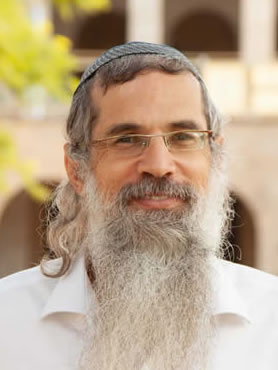Middat HaDin Delays The Geulah
הרב יצחק שטרן
Rabbi Shimon Bar Yochai was the greatest of the sages, one of the Torah giants of all the generations. In spite of this, it seems that precisely because of his greatness Hashem had to put him through an "educational process" – not just for himself, but also - and primarily - for us.
It wasn't by chance that HaShem put him into "confinement" for twelve years, and an additional year for "inappropriate behavior." Rashbi needed to learn something during those years, and to come out only after internalizing the message. He didn't need to learn only the Zohar, but a positive outlook on life as well.
Why was Rashbi "incarcerated"? Because of a negative outlook. When three Tannaim sat to discuss the actions of the Roman Empire in Israel (building roads, bathhouses, etc. - Shabbat 33b) several attitudes were expressed toward the situation (see further: Ein Ha'Ayia, Shabbat vol. 1, p. 259-261).
To everything which is done in the world, whether by individuals, communities or entire nations, there are positive sides and less-positive sides. Every person has the choice of where to focus his outlook.
Rabbi Yehuda chose to concentrate on the good, to look at the actions of the Romans through "Ayin Tova" (seeing the positive side). He gathered the crumbs of good from their negative actions. For his positive outlook, Rabbi Yehuda received reward. "Yehuda who raised (praised) – shall be elevated." He was made "the first of the speakers in every place." Do not be confused. It is not the Romans who gave him a reward because he spoke positively of them. That may be what happened in practice. But HaShem was the One who caused this to happen, He chose to advance one who looks at the world through Ayin Tova.
Rabbi Yossi "sat on the fence." And he was punished: "Yossi who remained silent - will be exiled to Tzippori."
And Rabbi Shimon Bar Yochai chose to see the negative side. Not, G-d forbid, as the result of bad middot (character traits) but out of an aspiration for complete, perfect good. He could neither reconcile with the negative things, nor to ignore them and "sweep them under the rug" so he chose to emphasize them. But apparently this is not the world-view which HaShem desires. Upon Rabbi Shimon was decreed: "Shimon who denounced – will be put to death." Again, this was not a punishment from the angry Romans, but a directive from HaShem: One who sees the world negatively – should not be living in the world.
The death sentence was "commuted" to 12 years of imprisonment: confinement in a cave and isolation from the world. After 12 years, Rashbi comes out and continues to burn the world, and is put again into "solitary confinement" – "Did you come out to destroy my world?! Go back to your cave!" Until he learned to look at the world through Ayin Tova: "He said to his son: See how the mitzvot are beloved by Israel."
The Nation of Israel returned to its land after thousands of years of exile and persecution. Eretz Israel is beautiful and blooming, with economic prosperity, high-level health care and many other wonderful things. Admittedly, not everything is perfect, and there are many things which need to be improved. We cannot ignore or neglect these things, but at the same time we cannot put them on center stage. We must not allow them to control us. Our "default" choice must be: a positive outlook. We will leave the negative things as footnotes.
This, possibly, lies also at the root of the well-known words of Chazal in Sanhedrin 97b, which state that HaShem is waiting to redeem us, and that we are waiting for His Redemption: "And since we are waiting and He is waiting, what is delaying (the redemption)? Middat HaDin delays (it)." The Geulah is already here. What prevents it from appearing? Our Middat HaDin - looking at the world from a viewpoint of Dinim (judgments). When we will be able to triumph over Middat HaDin within us, and view the world positively, through the attribute of Chessed, then we will see that we have gone a very long way in the process of the Geulah…
Lag Sameach!
השיעור ניתן בי"ד אייר תשפ"ד
קוד השיעור: 9408
לשליחת שאלה או הארה בנוגע לשיעור:



.jpg)

.jpg)
